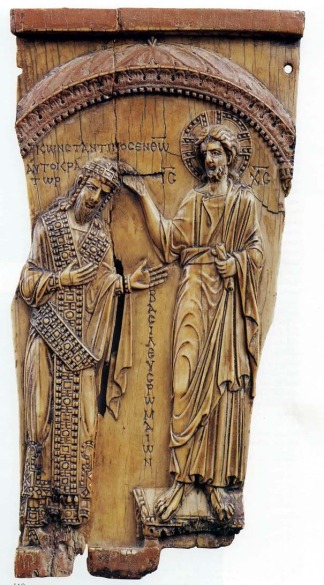Constantine VII was a tenth-century Byzantine emperor (AD 905 – 959). He was a member of the Macedonian dynasty, a line of very competent emperors who stabilized and expanded the Byzantine Empire, giving it its second wind after three centuries of shrinking borders following the conquests of Justinian the Great. Constantine VII was the fourth emperor in the Macedonian dynasty, and due to the fact that he spent much of his reign as co-emperor, he was not a particularly strong executive. He was, however, a very skilled administrator and is often referred to as a “scholar emperor” due to his collecting and writing of books and sponsorship of the arts.1 One of his biggest legacies is his book De Administrando Imperio (“On the Administration of the Empire”), written with the intention of giving his son a guide on how to run the empire both internally and externally. After a long section outlining the history of many of the nations surrounding the Byzantine Empire, Constantine VII went on to highlight the bad ends and soiled legacies of those emperors who violated secular and religious law and custom in their dealings with foreigners.
According to Constantine VII, there were three cardinal sins a Byzantine emperor could commit in regards to foreign peoples.
- Misappropriation of the Patriarch’s vestments and jewels, such as giving them away as war concessions or the secular use of them to impress foreigners
- Giving away the secret of Greek fire or allowing it to be manufactured in any city which was not Christian
- Marrying or having your son or daughter marry a foreigner, excepting the Franks, particularly the northern pagans or eastern Muslims
For each point, Constantine VII talks about an emperor who violated these laws and how he came to a bad end with a soiled legacy. What’s really interesting is that he explicitly connects #3 with #1. Constantine VII claims that Leo IV married a Khazar, while secular sources say that his father married a Khazar, making Leo IV half-Khazar. Either way, the Khazar influence led Leo IV to seize one of the Patriarch’s jewels from the Hagia Sophia without permission and set it upon his forehead as a crown, at which point he was struck down with an illness that eventually killed him. Constantine VII makes the application clear: foreign mixture leads to religious sin. Note that in either case the Khazar princess was said to have been baptized, but this changed nothing. Constantine VII considered this “a sufficient warning to restrain anyone who is minded to emulate his evil deeds.”
To summarize this principle, Constantine VII writes:
For each nation has different customs and divergent laws and institutions, and should consolidate those things that are proper to it, and should form and develop out of the same nation the associations for the fusion of its life. For just as each animal mates with its own tribe, so it is right that each nation should marry and cohabit not with those of other race and tongue but of the same tribe and speech. For hence arise naturally harmony of thought and intercourse among one another and friendly converse and living together; but alien customs and divergent laws are likely on the contrary to engender enmities and quarrels and hatreds and broils, which tend to beget not friendship and association but spite and division.
| Tweet |
|
|
|





